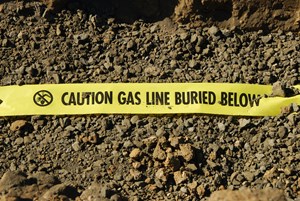Federal regulators propose rule changes after 2018 gas distribution pipeline blasts in Massachusetts
BOSTON (AP) — Federal regulators are proposing a series of rule changes aimed at toughening safety requirements for millions of miles of gas distribution pipelines nationwide, following a string of gas explosions in Massachusetts in 2018.

These proposed changes are designed to improve safety and ease risk through the improvement of emergency response plans, integrity management plans, operation manuals and other steps, according to the U.S. Department of Transportation’s Pipeline and Hazardous Materials Safety Administration.
This proposal was prompted by the series of blasts that ripped through parts of the Merrimack Valley region of Massachusetts.
The explosions and fires in Lawrence, Andover and North Andover in September 2018 left a teenager dead, about two dozen injured and destroyed or damaged more than 130 properties. Thousands of residents and businesses were also left without natural gas service for heat and hot water for months in some cases.
Leonel Rondon, of Lawrence, died after the chimney of an exploding house crashed onto his car and crushed him. The 18-year-old Rondon had received his driver’s license just hours earlier. Rondon’s family later reached a settlement with the utility involved in the disaster.
The explosions were caused by over pressurized pipelines operated by Columbia Gas of Massachusetts, according to a federal investigation. The utility agreed to pay the state $56 million in 2020 in addition to a $53 million federal fine and a $143 million lawsuit settlement.
Transportation Secretary Pete Buttigieg said millions of miles of gas distribution pipelines deliver energy to tens of millions of Americans, heating homes and powering businesses.
“As the tragic death of Leonel Rondon in 2018 reminded us, more must be done to ensure the safety of those pipelines,” Buttigieg said in a statement Thursday.
The proposal calls for improved construction procedures to minimize the risk of over pressurized pipelines and updated management programs to prepare for over-pressurization incidents.
The changes require new regulator stations to be designed with secondary pressure relief valves and remote gas monitoring to prepare gas distribution systems to avoid over pressurization and to limit damage during those incidents.
Finally, the plan calls for strengthening response plans for gas pipeline emergencies, including requirements for operators to contact local emergency responders and keep customers and the affected public informed of what to do in the event of an emergency.
The notice of the proposed rules changes will be published in the federal register, kicking off a public comment period. The agency will review the comments before issuing final rules.
In 2019, the National Transportation Safety Board, which investigates major pipeline accidents, recommended tougher nationwide requirements for natural gas systems, including mandating all natural gas infrastructure projects to be reviewed and approved by a licensed professional engineer.
Nineteen states had such a requirement at the time, but most had specifically exempted the natural gas industry from such review requirements.
The board had also recommended natural gas utilities be required to install additional safeguards on low pressure systems.
Regulators say the new proposal builds on other national and international actions pushed by Congress and the Biden administration to reduce methane emissions — a greenhouse gas with more than 25 times the global warming potential of carbon dioxide.
Earlier this year, the first $196 million from the nearly $1 billion Natural Gas Distribution Infrastructure Safety and Modernization grant program were announced.
Related News
From Archive

- Glenfarne Alaska LNG targets late-2026 construction start for 807-mile pipeline project
- U.S. water reuse boom to fuel $47 billion in infrastructure spending through 2035
- $2.3 billion approved to construct 236-mile Texas-to-Gulf gas pipeline
- Major water pipe break in Puerto Rico hits over 165,000 customers
- Potomac River Tunnel project enters construction phase beneath Washington, D.C.
- Pennsylvania American Water launches interactive map to identify, replace lead water service lines
- Trump's tariffs drive $33 million cost increase for Cincinnati sewer project
- Utah city launches historic $70 million tunnel project using box jacking under active rail line
- Tulsa residents warned after sewer lines damaged by boring work
- Fatal trench collapse halts sewer construction in Massachusetts; two workers hospitalized



Comments